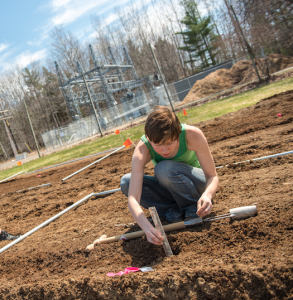Bank Robber
A digital decision-aid tool aims to help organic farmers make permanent withdrawals from their agricultural weed seed banks
Farming is a growing sector of the Maine economy, with substantial increases over the past 10 years in the number of farms, value of agricultural products, and number of farmers under the age of 34—respectively, increases of 17, 65, and 46 percent.
And many of those farmers choose to grow organically, motivated by deeply held commitments to environmental sustainability (organic farming practices are typically more environmentally sustainable than conventional practices).

Economic sustainability, however, relies heavily on a farmer’s ability to manage their weeds using organic methods, which can be tricky without the use of conventional pesticides and herbicides. Many organic farmers in the Northeast cite weed management as a foremost production challenge.
What makes it so challenging is the weed seed bank: the number of seeds stored in the soil. On the high end of the scale, there can be over 50,000 germinable weed seeds per square meter of soil 10 centimeters deep on an organic farm in the Northeast. That’s a lot of potential recruits to choke the life out of your crops and wither away your profits.
The best way to decrease the seeds in your bank, says UMaine Ecology and Environmental Sciences Ph.D. student Sonja Birthisel, is by “letting them germinate and then killing them.” Pulling up the weeds, driving a tractor through with a cultivator, or applying a mulch that smothers the weeds are tried-and-true methods.
“There are lots of ways to kill them once they’ve germinated,” says Birthisel, “but seeds that are lying dormant in the seed bank are much harder to kill, and that’s why it’s a perennial problem for farmers.”
Thus, there is clear need and support in the organic farming community for tools to help farmers effectively manage weeds, especially tools that help a farmer target specific weed issues, like the pernicious Hairy Galinsoga—perhaps the biggest weed issue facing Maine’s organic vegetable farmers today.
To that end, Birthisel is on the team of a Senator George J. Mitchell Center for Sustainability Solutions-funded project that has created an educational tool known as “WEEDucator.” Part decision-aid, part computer game, this tool allows farmers to explore different weeding methods, learn more about the life cycles of common weeds, and includes an interactive model that farmers can use to manage their weed seed banks virtually—helping them learn through ‘trial and error’ without the real-world costs.
When asked what farmers have to say about this project, Birthisel says most have “been excited and thought it sounded like a good idea, especially young, beginning farmers, those who use smartphones,” Birthisel says. “They say, ‘This is a great idea, make sure you include Hairy Galinsoga!’” Birthisel says the current version of WEEDucator is designed to appeal to beginning farms and agriculture students.
WEEDucator currently operates as a desktop computer program, and allows users to model different scenarios and instantly see their outcomes without risk of losing a real harvest by choosing a wrong option. Users start by estimating their initial seed banks, then choose from a variety of weed management techniques, decide when to apply them, and can instantly see what that would do to their virtual seed bank.
WEEDucator is mathematically based and is underpinned by real-world data collected by Birthisel, her graduate adviser Eric Gallandt, and others in their program, as well as data from the science literature.
Notes Birthisel, “There’s a lot of data available about how effective different weed management strategies are at controlling different species under different soil conditions.” The problem is in getting that information to farmers in an accessible and useful and form.
She adds, “Models of this kind are useful in that they offer relatively low-cost means of utilizing existing data to greatly expand existing knowledge.” WEEDucator is an exciting first step toward synthesizing weed management knowledge in an interactive, easy-to-use platform, and a promising prototype for things to come, according to Birthisel.
Read about Birthisel’s work in the Portland Press Herald’s “Meet” sustainability section.
—David Sims
